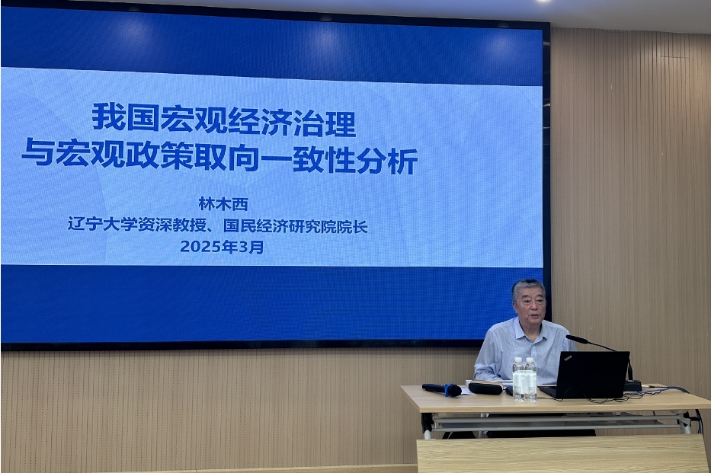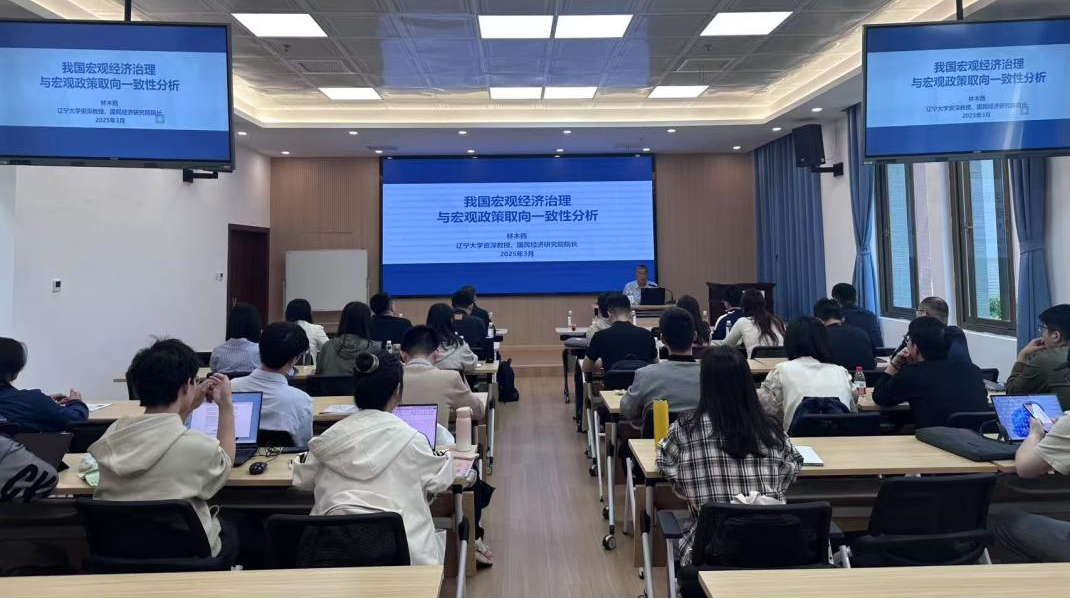On March 26, 2025, Professor Lin Muxi, Dean of the National Economic Research Institute at Liaoning University, was invited to deliver an academic lecture titled "Macroeconomic Governance and Consistency Analysis of Macro Policy Orientations" at the School of Economics and Management as part of the Yangtze Forum. The event, hosted by Wuhan University and organized by the Institute for Advanced Studies in Humanities and Social Sciences and the School of Economics and Management, was attended by Professor Luo Zhi, Vice Dean of the School of Economics and Management, Professor Yang Mian, Director of the Economic Research Institute, faculty members, and students. The forum was chaired by Professor Gong Liutang.

Evolution of China’s Macroeconomic Governance System
Professor Lin began by reviewing the evolution of China’s macroeconomic governance framework. He noted that since the 18th National Congress of the Communist Party of China, macroeconomic regulation has gradually shifted from demand-side management to supply-side structural reforms. The supply-side structural reform proposed in 2015 became a central policy focus, further emphasized at the 2019 Central Economic Work Conference, marking a transition from singular demand management to a balanced approach addressing both supply and demand. Professor Lin highlighted that the 2024 Central Economic Work Conference explicitly called for "balancing aggregate supply and demand," signaling a new phase in the modernization of China’s macroeconomic governance. Under the "New Three Stabilities" framework, macroeconomic regulation must not only balance supply and demand but also enhance market expectations and policy sustainability to ensure economic resilience.
Risks of Policy Inconsistency and Pathways to Coordination
In the core section of his lecture, Professor Lin analyzed the risks posed by inconsistent policy orientations. He explained that while individually designed policies may serve specific objectives, their collective implementation could lead to a "fallacy of composition," where conflicting measures undermine overall effectiveness. Thus, improving policy consistency is key to enhancing macroeconomic regulation.
Professor Lin cited recent academic insights to underscore this point:
Chen Yanbin (2022): An excessive number of policy targets can lead to inconsistency, whereas streamlined objectives improve efficiency.
Zhang Xiaojing (2024): Macro policies must achieve "three-dimensional unity"—aligning reform, development, and stability goals—while integrating expectation management, demand management, and supply management.
Gao Peiyong (2024): The "twin engines" of policy and reform are not equivalent; reform should dominate, with policy playing a supportive role to bolster market confidence.
Professor Lin further examined current policy trends, noting a shift from supply-side reforms alone to a "reform + policy" hybrid model. For instance, the 2024 Politburo meeting emphasized "effectively implementing existing policies while intensifying new measures," reflecting a coordinated approach using monetary, fiscal, and real estate policies to stimulate recovery. Simultaneously, the government is strengthening alignment between macroeconomic and non-economic policies to ensure consistency in formulation and execution.

Interactive Discussion: Challenges in Policy Coordination
During the Q&A session, faculty and students discussed real-world challenges in policy coordination. Professor Luo Zhi shared observations from corporate surveys, such as a 2020 case in Wuhan where a district government encouraged restaurants to reopen post-lockdown, only for urban management officials to penalize them for "sidewalk occupation." This highlighted misaligned objectives across government agencies, creating dilemmas for businesses.
In response, Professor Lin stressed that delineating the roles of government and market is central to resolving such conflicts. He argued that governments should focus on public goods (e.g., infrastructure, social welfare) while allowing markets to operate freely in other domains, intervening only during market failures. This dynamic process, he noted, requires continuous optimization to achieve "an effective market and a proactive government"—a cornerstone of socialist market economy development.
Conclusion
The forum provided profound academic insights by bridging theory and practice, deepening understanding of China’s macroeconomic governance and offering fresh perspectives on high-quality development. Wuhan University and the School of Economics and Management will continue to foster high-level academic exchanges to support research on economic policies and frontier issues.
(Correspondent: Zhang Wenzhe; Reviewer: Huang Minxue)
 Faculty and Staff
Faculty and Staff Academics
Academics International Exchange
International Exchange







